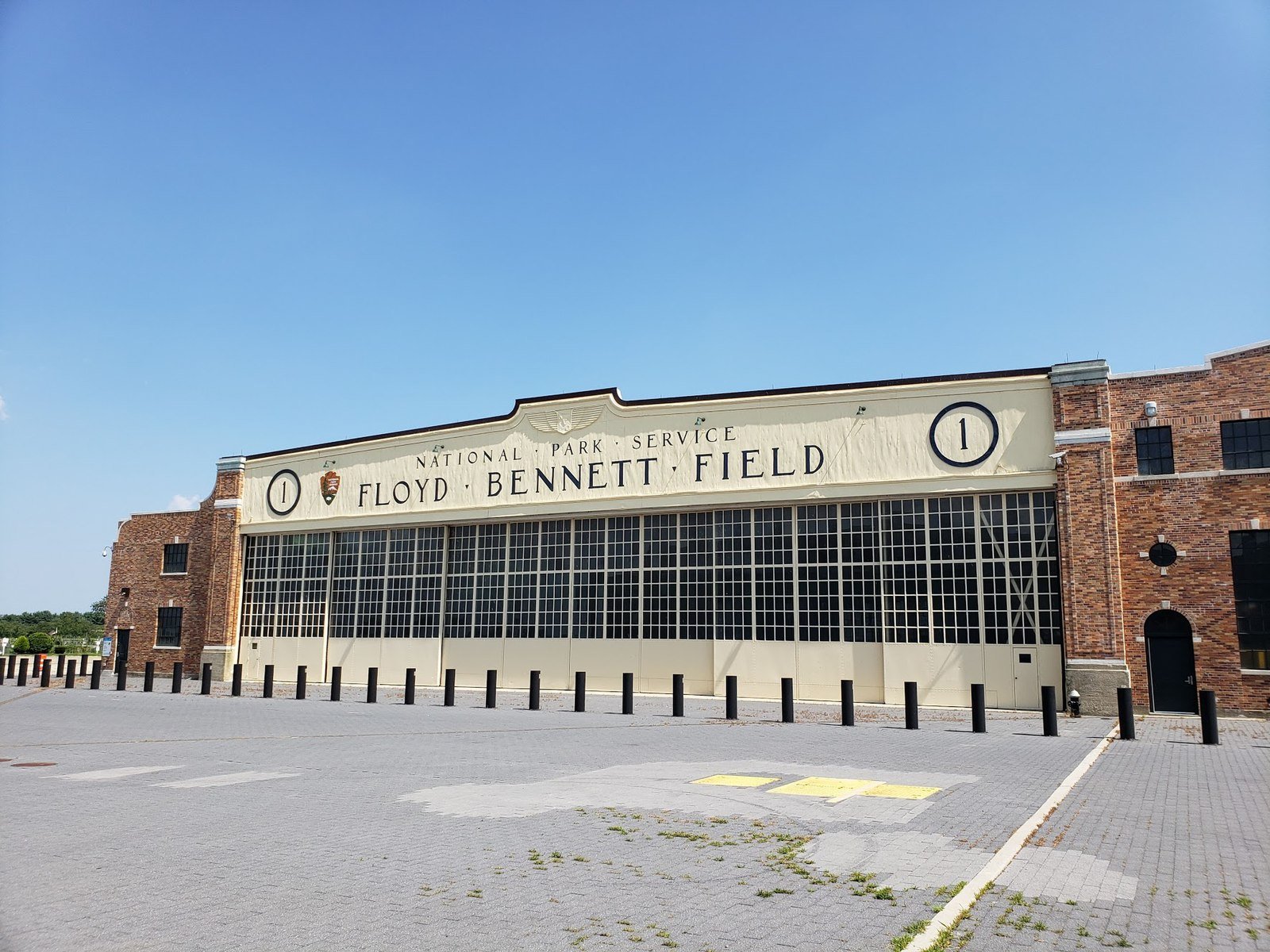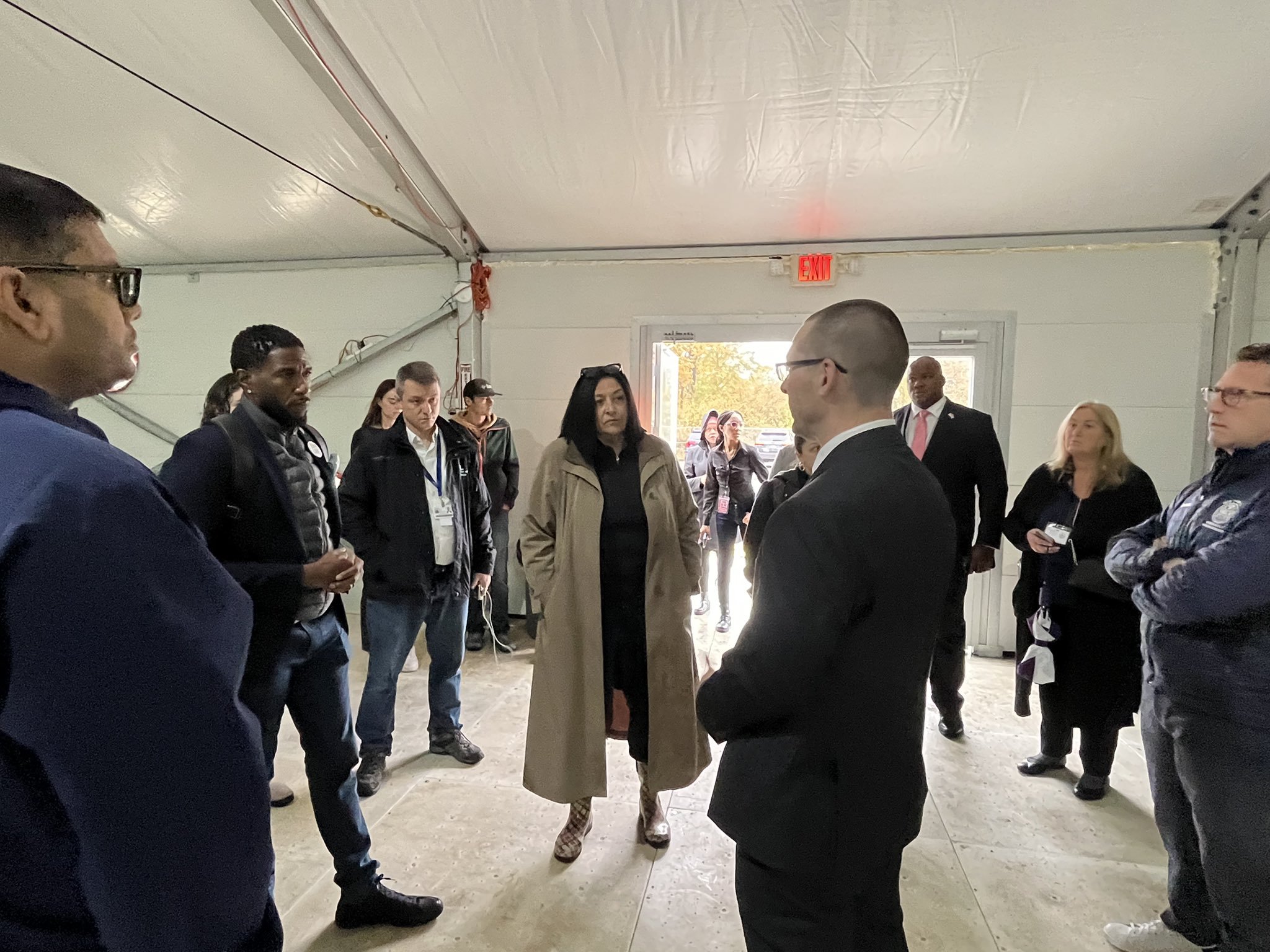Legal Aid bashes Floyd Bennett Field migrant shelter plan
/Advocates from the Legal Aid Society are opposing the city’s plans to put kids and families in the Floyd Bennett Field migrant shelter. Photo via Wikimedia Commons/Gmerrill
By Ryan Schwach
The city’s plan to start housing migrants at Floyd Bennett Field in Brooklyn received more criticism this week – this time over intentions to house families with children at the shelter.
On Wednesday, the Legal Aid Society and Coalition for the Homeless took shots at the city’s plan, saying that putting families in semi-congregate settings at the soon-to-be-opned tent shelter would be a “recipe for disaster.”
“The facility falls woefully short of providing the accommodations that this vulnerable population needs and deserves,” said Adriene Holder, the chief attorney of the Civil Practice at The Legal Aid Society in a statement. “The city must abandon its misguided effort to use Floyd Bennett Field as an option to shelter families with children, and we fear the worst should City Hall continue with this fraught, cruel and patently dangerous plan.”
Legal Aid is currently in open litigation with the city over the Adams administration’s attempt to suspend Right to Shelter rules. Legal Aid is representing the Coalition for the Homeless in the case, who also spoke against the plan to house families at Floyd Bennett on Wednesday.
“Enormous tents filled with tiny cubicles in what feels like the middle of nowhere is not in any way an appropriate setting for families with kids. It’s really unimaginable that anyone thought this was a good idea,” said Dave Giffen, the executive director of Coalition for the Homeless. “Putting the health and wellbeing of children, pregnant individuals, and families at risk is not okay, and we hope the Mayor and Governor pursue more sensible solutions.”
Although the groups are arguing against housing kids and families there, they are not calling for the shelter to be scrapped altogether, like some local leaders and community members, including a number from neighboring Queens neighborhoods.
“The city is in urgent need of space for single adults and could use Floyd Bennett Field to meet that need,” a Legal Aid spokesperson told the Eagle.
Legal Aid listed several reasons why they believe having kids and families at the shelter is the wrong idea, including safety and sanitary issues.
They said they were concerned about a lack of restroom facilities, cramped sleeping spaces, hazardous conditions around the shelter including uneven pavement, lack of educational resources for kids and privacy concerns.
Similar to the arguments from local officials in Eastern Queens related to the Creedmoor migrant shelter earlier this year, Legal Aid also pointed to the site’s isolation, particularly in the context of kid’s access to education.
“Children will have long commutes to school,” Legal Aid said. “Parents cannot reliably get their children to school or pick them up as needed due to the shuttle running only every 90 minutes.”
As far as public transportation is concerned, only the Q35 bus route is within nearly three miles, the next closest being bus stops near Kings Plaza Mall in Marine Park, Brooklyn. The nearest subway stations are at Beach 116th Street in Rockaway and Flatbush Junction near Brooklyn College – both more than four miles away, but accessible via the Q35.
In a statement to the Eagle, Councilmember Joann Ariola, who is locked in a legal challenge of the city’s plan to open a shelter at Floyd Bennett Field, said she agreed with the Legal Aid Society’s arguments.
"I absolutely agree with the assessments made by the Legal Aid Society - this location is not safe, and it is not humane,” she said. “Our city is filled to capacity, and we simply cannot take in any more people. Taking people fleeing from a dangerous situation in their homelands, and placing them in another dangerous situation in Brooklyn does not help anyone."
Meanwhile, advocates’ challenges to children and families at Floyd Bennett are still not the only snag in the city’s hopes to open the shelter, with local electeds continuing to pursue a case calling for the city to scrap its plan to build the shelter.
The ongoing court injunction against the shelter filed chiefly by Ariola and Brooklyn Assemblymember Jaime Williams has bounced around various courts in recent months.
The case began with a hearing before a Richmond County Supreme Court judge in early October before the city requested the case be moved to a federal court. It was then moved to a a Brooklyn court before again landing back in Staten Island.
According to Ariola’s office, the next court date – which was most recently scheduled for Friday – will now be Thursday, Nov. 9, in the courtroom of Supreme Court Judge Wayne Ozzi.
Ozzi – a Queens College graduate – recently ruled on another migrant shelter case, ordering migrants to vacate a Staten Island school building, St. John’s Villa, in September.
Officials toured the new shelter at Floyd Bennett Field last week, but some, like Queens Councilmember Joann Ariola, still oppose the plan. File photo via Ariola/Twitter
On Nov. 9, Ozzi will decide on if he wants to consolidate the two cases – or to combine the motions together – a move that has the support of thepetitioners, and if successful, could mean more stringent legal challenges for the city when it comes to upholding shelter plans.
Associate St. John’s Law Professor Catherine Duryea, who has a particular focus in institutional constraints on executive power during emergencies, sees consolidation as a strong possibility.
“It could make sense to consolidate them because there are some common factual issues,” she said. “There is some overlap in the legal issues – there was overlap in the question about local zoning codes and there is some overlap in the constitutional arguments.”
Although the cases are not exactly identical, and Ozzi’s earlier decision with the St. John’s Villa case does not necessarily create any kind of precedent, there is still enough in common for consolidation to make sense, Duryea said.
“Nevertheless, there doesn't have to be perfect overlap in order for it to make sense to consolidate the case,” she said. “It could be more efficient to consolidate the cases because there are some common questions of facts at law.”
If he chooses not to consolidate, there could be a chance the city tries again to move the case over to Brooklyn.
“We await our day in court to have our case heard,” Ariola said in a tweet.





